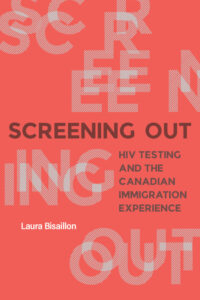Laura Bisaillon, Screening Out: HIV Testing and the Canadian Immigration Experience (UBC Press, 2022, 288 pp., ISBN-13: 978-0774867481).
Book review by Kevin Madill
 Laura Bisaillon’s Screening Out: HIV Testing and the Canadian Immigration Experience is a pioneering examination of how Canada’s immigration policies intersect with HIV testing. Bisaillon offers an in-depth analysis of how these policies affect immigrants living with HIV who must undergo testing as a non-negotiable part of their immigration process. Bisaillon’s comprehensive study not only critiques the existing system but also proposes evidence-based recommendations for its improvement.
Laura Bisaillon’s Screening Out: HIV Testing and the Canadian Immigration Experience is a pioneering examination of how Canada’s immigration policies intersect with HIV testing. Bisaillon offers an in-depth analysis of how these policies affect immigrants living with HIV who must undergo testing as a non-negotiable part of their immigration process. Bisaillon’s comprehensive study not only critiques the existing system but also proposes evidence-based recommendations for its improvement.
At the heart of Bisaillon’s work is the tension between Canada’s proclaimed values and the lived experiences of immigrants subjected to mandatory HIV testing. While the Canadian state aims to align its immigration policies with Canadian values such as anti-discrimination, social justice, gender parity, and human rights, Bisaillon’s interviews reveal a distressingly different reality. Immigrants living with HIV face significant challenges through the Canadian immigration process, including deportation, incarceration, inadequate healthcare, and limited access to medication. Bisaillon’s early work as a community services worker at an HIV/AIDS service organization in Montreal equips her with firsthand knowledge of these tensions, as she assisted francophone and female members seeking Canadian state protection as refugee applicants.
In 2002, an amendment was introduced to Canada’s Immigration and Refugee Protection Act for mandatory serological screening as a routine component of the immigration medical examination. The amendment normalized HIV testing for immigrants and contrasts starkly with Canadian law, which prohibits HIV testing of Canadian citizens or permanent residents without consent, except in specific, court-ordered situations. Bisaillon’s analysis highlights the contradiction between the immigration HIV testing policy and the legal and ethical standards that apply to Canadian citizens.
In her examination of the Canadian immigration system’s structure and governance, Bisaillon identifies two particularly troubling aspects of the immigration medical process: medical reports and post-test counseling for applicants who test HIV-positive.
The text-based format of the medical report serves as the foundation of the immigration process, involving various stakeholders such as immigration doctors, radiologists contracted by the Canadian state, as well as medical and immigration officers working within and outside Canada. This medium facilitates sharing critical clinical-diagnostic laboratory results, which are then processed and shared through the institutional bureaucracy to inform decisions on Canadian permanent residency. This process transforms applicants into bureaucratic categories, distancing the state from individuals and therefore from the real-life implications of state policy.
For immigration applicants, it is especially crucial that the mandatory HIV testing and the disclosure of positive serostatus be accompanied by proper counseling, given that such disclosure is involuntary and can have severe consequences. Bisaillon provides the example of Martha (a pseudonym), a Black woman born in sub-Saharan Africa who was seeking to immigrate to Canada from Russia. After undergoing HIV testing as part of her immigration process, Martha learned of her HIV-positive status during a follow-up appointment. The absence of counseling during this appointment worsened her already vulnerable situation, as she received no referrals to support services and faced the threat of deportation to her home country, where she could encounter significant discrimination.
Interestingly, Bisaillon points out that Canada is an outlier among Organization for Economic Co-operation and Development (OECD) countries in mandating HIV testing for immigrants. Most OECD countries do not use medical examinations to exclude individuals with chronic health conditions, developmental disorders, or genetic differences.
To align Canada’s immigration system with OECD practices and better reflect Canadian values, Bisaillon proposes three strategies: revising medico-legal and administrative practices, overhauling internal processes, and eliminating the current HIV testing requirements. Her central argument is that the mandatory HIV test creates unnecessary complications in HIV counseling, consent, and referral processes. It also risks sharing sensitive diagnostic information across state bureaucracies both within and outside of Canada. Simply put, the test should be abandoned. In the face of escalating migration and immigration pressures in Canada, we cannot afford to overlook Bisaillon’s timely and vital recommendations.
Screening Out is essential reading for a general audience unfamiliar with the Canadian immigration process and governmental institutional systems. Individuals seeking permanent residency in Canada will find it particularly enlightening. Law students and legal professionals will deepen their understanding of Canadian immigration policy and gain insights into navigating legal and medical immigration requirements. Importantly, those aspiring to participate in governmental policy-making may discover in Bisaillon’s work a valuable template for developing and/or reforming governmental regulatory policy as it applies to other areas of the social sciences.
Kevin Madill is a music librarian at the University of British Columbia and researches and writes on the subjects of AIDS, grief, and classical music. Kevin curated the University of Toronto exhibition “I’ve Got U Under My Skin: AIDS & Classical Music” (September 27, 2023 to December 15, 2023) and is author of the exhibition’s accompanying essay.